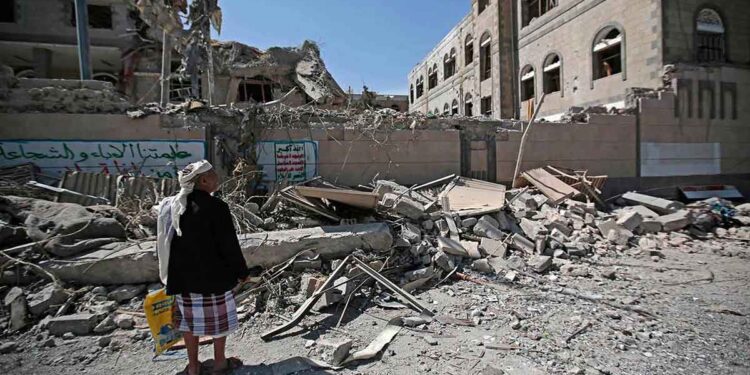The United States’ ongoing military campaign in Yemen has drawn sharp concern from humanitarian agencies and legal observers, as airstrikes continue to devastate civilian areas, including critical infrastructure and humanitarian facilities, in the absence of any meaningful international accountability.
Last week, a series of US-led airstrikes targeted the Ras Issa port and surrounding regions on Yemen’s Red Sea coast, killing scores of civilians and inflicting severe damage on port infrastructure. The UN Secretary-General António Guterres expressed grave concern following the strikes, which reportedly killed at least 80 people and injured 150 more, including humanitarian workers and emergency responders. His spokesperson, Stéphane Dujarric, confirmed that the attacks had caused significant damage and raised the risk of a large-scale oil spill, prompting an emergency response from nearby medical facilities.
The health ministry under the de facto authorities in Sana’a reported that the death toll is likely to rise as rescue efforts continue. Many of those injured were responding to the initial strike when they were caught in subsequent bombardments. The strikes on Ras Issa form part of a broader escalation, with local and international media documenting hundreds of air raids by US forces across Yemen since mid-March. According to official health data, 205 civilians have been killed and over 400 injured since the air campaign resumed.
The attacks have included strikes on civilian areas, ports, and health facilities — all of which are protected under international humanitarian law. The Geneva Conventions prohibit attacks that fail to distinguish between civilian and military targets and mandate the protection of essential infrastructure during armed conflict.
Humanitarian organisations have raised alarm over the compounded effects of the attacks, which come amid growing fears of a full-scale humanitarian and environmental crisis. The destruction of critical facilities near the Red Sea threatens not only the Yemeni population but the surrounding region, should an oil spill occur.
The latest wave of airstrikes is reportedly part of a broader directive issued by US President Joe Biden in response to attacks on commercial shipping lanes in the Red Sea. Armed groups in Yemen have claimed responsibility for targeting vessels associated with Israel and its allies, citing retaliation for the ongoing war in Gaza.
Since the collapse of a temporary ceasefire in Gaza on 18 March, over 1,700 Palestinians have been killed and nearly 4,700 wounded, bringing the total number of casualties since 7 October 2023 to more than 168,000, with thousands more still missing. These figures include an overwhelming number of women and children.
As the conflict in Gaza intensifies, so too does the spillover violence in Yemen and the broader region, exacerbating humanitarian suffering and further destabilising civilian life. Rights groups and UN agencies are calling for urgent action to halt attacks on civilians and to initiate independent investigations into all alleged violations of international law.
The continued use of lethal force without adherence to international legal safeguards risks entrenching a culture of impunity. Humanitarian organisations stress the urgent need for accountability and call on the international community to act swiftly to prevent further loss of civilian life and irreversible environmental damage.


























